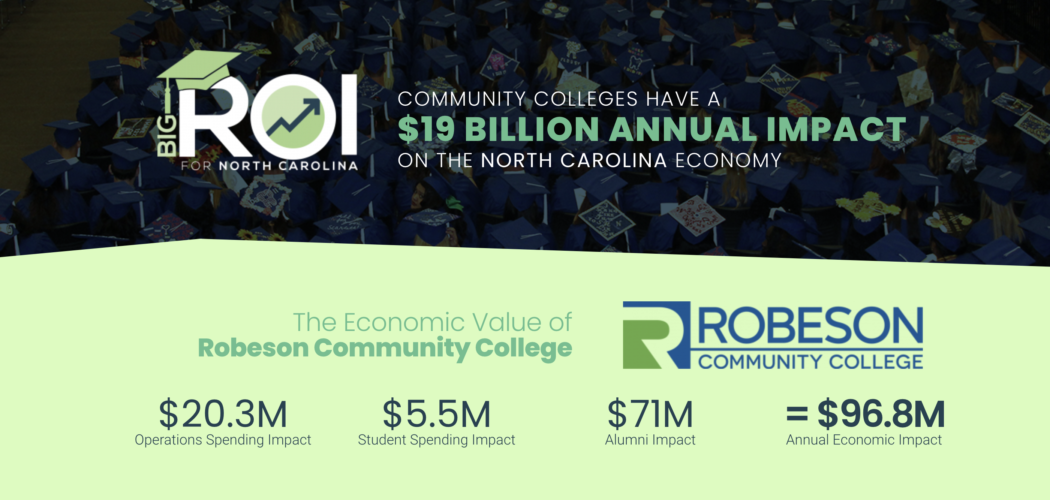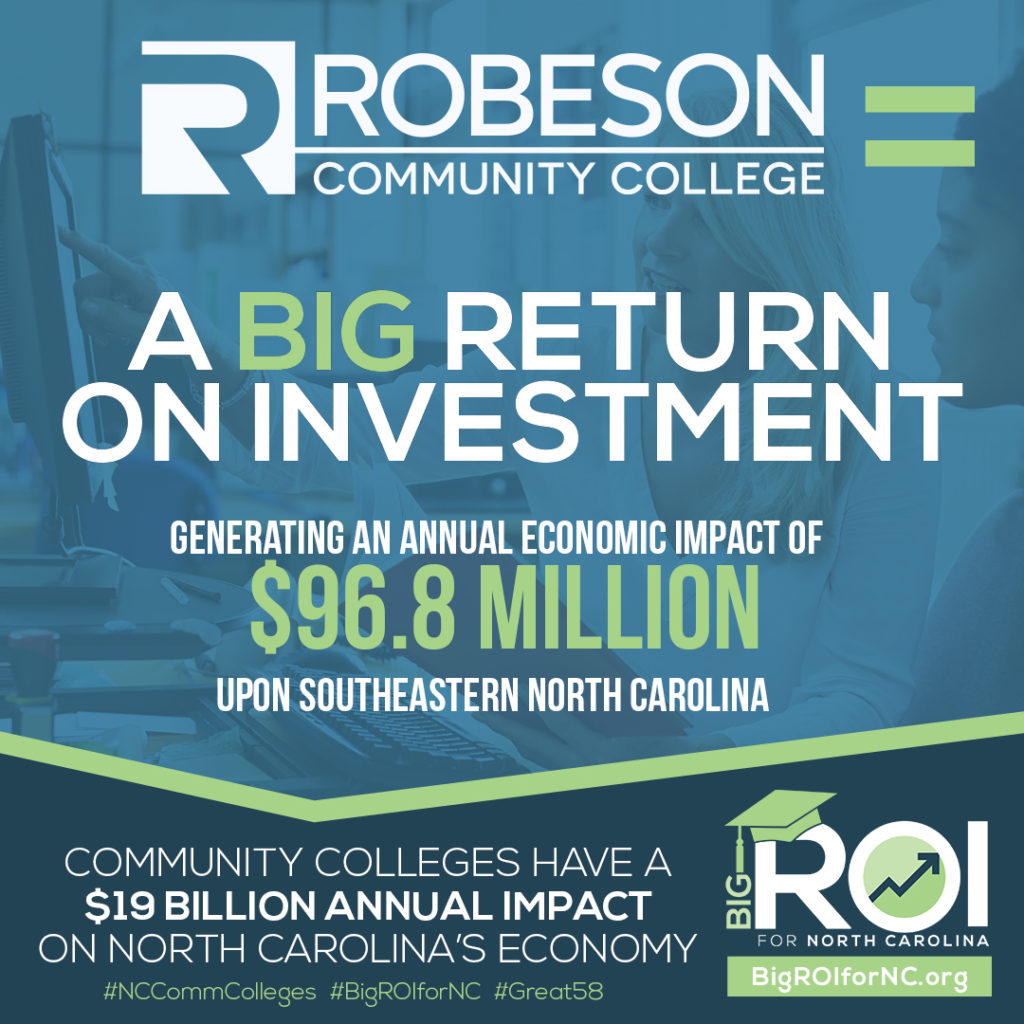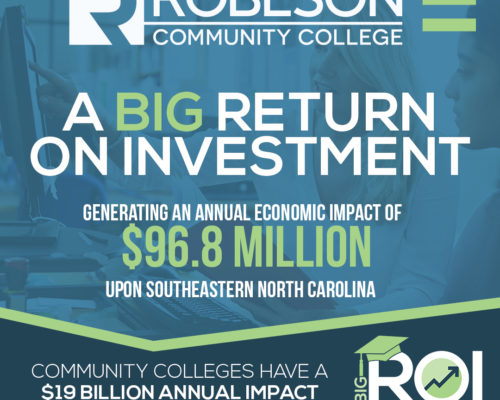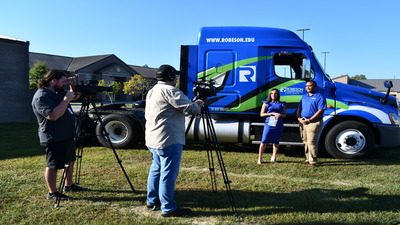
Study finds RCC has major economic impact on region
Robeson Community College continues to soar to new heights, and a new study by Emsi Burning Glass, has provided an in-depth review into the major economic engine that RCC has become.
Emsi Burning Glass is a national leading research provider of economic impact studies and labor market data to educational institutions, workforce planners, and regional developers in the U.S. and internationally. Since 2000, Emsi Burning Glass has completed over 2,200 economic impact studies for educational institutions in three countries. Along the way, Emsi Burning Glass has worked to continuously update and improve our methodologies to ensure that they conform to best practices.
The report from Emsi Burning Glass was made possible from the collaboration and support of the North Carolina General Assembly, leaders from the N.C. Association of Community College Presidents, the N.C. Community College System Office, the Center for Applied Research, N.C. State’s Belk Center for Community College Leadership and Research, and the John M. Belk Endowment to produce a regional Economic Impact Study for each of the state’s 58 community colleges, as well as an overall statewide report.
According to data collected by Emsi Burning Glass, Robeson Community College generates a total economic impact of $96.8 million in total added income for the regional economy, equivalent to supporting 1,612 jobs. The study also finds that the total impact of RCC alumni is $71 million in added income, which is equivalent to supporting 1,044 jobs.
“Robeson Community College is a major anchor of Robeson County’s economy,” said RCC President Melissa Singler. “An investment in Robeson Community College is an investment in the local and regional economy, driving economic development and spurring growth in manufacturing, healthcare, retail, education and our growing tourism and hospitality sector, among others.”
Five of Robeson Community College programs were also assessed on the impact they made upon the area economy, the return on investment for students, and the benefits generated for N.C. taxpayers.
The high-demand career pathways quantified in the report include jobs and programs related to business technologies, education, industrial and engineering technologies, and health sciences.
The greatest economic impact of RCC stems from the added human capital—the knowledge, creativity, imagination, and entrepreneurship—found in its alumni.
For Robeson Community College, the report shows that when a student invests in an education working towards a degree, diploma, or certificate, the student sees a return of $7.00 for every dollar spent, resulting in a 28.6 corresponding annual rate of return.
“Our students leave Robeson Community College highly trained and prepared for the workforce,” said Singler. “Our programs are state-of-the-art and provide skills that are future oriented as well as relevant to the world we live in today, allowing our graduates to land jobs that build upon the economy of North Carolina.”
These results indicate that RCC is an attractive investment to students with rates of return that exceed alternative investment opportunities. At the same time, the presence of the college expands the state economy and creates a wide range of positive social benefits that accrue to taxpayers and society in general within North Carolina.
The studies also found that each of North Carolina’s community colleges pump millions of dollars into the regions they serve – creating jobs, wealth, and opportunities for local residents. North Carolina’s 58 community colleges represent a combined $19 billion in annual impact on the state’s economy and support one out of every 19 jobs in the state.
“The return on investment in our community colleges is unmatched – not only for students and parents, but taxpayers and our entire state economy,” said N.C. Community College System President Thomas Stith. “We are proud of the contributions of our graduates and employees to enhance and strengthen our North Carolina communities.”
The economic impact study found for every dollar the state invests in North Carolina’s Community Colleges, the state gains $7.50 in added incomes and social savings. The colleges generate nearly double the revenue from what they take in from the taxpayers. For every $1 the state invests, taxpayers get $1.90 back in added tax revenues and public sector savings.
“It’s been a privilege to have worked and supported our education partners on this study from the beginning as I was confident the results would blow us away. And it did. I think it’s fair to say not many government-funded programs generate more revenue than they take in from taxpayers,” said State Senator Deanna Ballard, chair of the Senate Education Committee. “It’s critical that our high school graduates and adults looking to gain new skills take advantage of the incredible opportunities that their local community college provides.”
Community college graduates have higher incomes that contribute to a larger tax base and a growing state. Students who graduate with an associate’s degree from a N.C. community college will see an increase in earnings of up to $7,000 or more each year compared to a person with a high school diploma or equivalent. If the student builds upon their associate’s degree to then earn a bachelor’s degree, their annual income also doubles on average.
“Our community colleges are among the state’s most critical assets to leverage and accelerate the education and upskilling of our State’s homegrown talent,” said MC Belk Pilon, president and board chair of the John M. Belk Endowment. “As we look ahead, we must continue and accelerate investments in our 58 community colleges to ensure we increase access to economic mobility, prepare North Carolinians for the jobs of today and tomorrow, and further grow local and state economies.”
More information about the statewide economic impact studies, including that of Robeson Community College, can be found online at www.robeson.edu/emsi.













